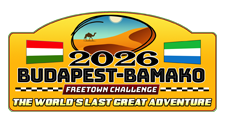Read these questions and answers carefully if you’re considering entering the race. If you’re not into reading, just watch this short video.

Read these questions and answers carefully if you’re considering entering the race. If you’re not into reading, just watch this short video.
Budapest-Bamako is a charity rally, competition and crazy driving adventure from Budapest to Bamako. Budapest-Bamako is for those who’ve dreamed about the Dakar, Africa, the Sahara and hitting the open dirt under extreme circumstances. B2 is a minimal assistance event, which means that if you’re in trouble you can only count on yourself and your mates. You can enter in competition and adventure category. B2 is not a Sunday drive or picnic in the park. It’s not an organized package holiday. It’s a grueling two week drive on hostile terrain.
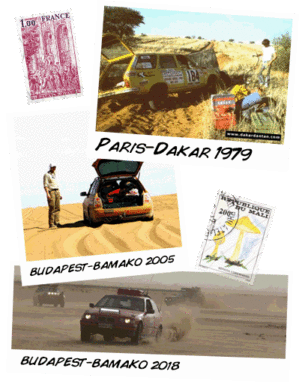
Thanks to years of experience we have a good sense of how much it should cost. You should be aware of your car’s fuel consumption and your needs along the way. There are teams who camp by the side of the road every night. Other spend money on champagne and fancy hotels. The following calculation is a relatively middle of the road budget. It can be lower and can be higher.
The price of the vehicle and the entry fee is not included in this budget.
| VISAS | 350 Euro |
|---|---|
| VACCINATION | 230 Euro |
| INSURANCE + PERMITS | 550 Euro |
| FUEL | 800-1500 Euro |
| ROAD TOLLS | 150-190 Euro |
| FERRY | 300-450 Euro |
| ACCOMMODATION | 200-500 Euro |
| FOOD | 500 Euro |
| MECHANIC | 400 Euro |
| SLUSH FUND | 100 Euro |
| PLANE TICKET | 1000 Euro |
| TOTAL | 6010-7000 Euro per 2 Person,1 Vehicle |
So for 6000-7000 Euros 2 people can comfortable manage the rally. If you come with 2-3 other friends you can reduce the per person costs greatly by splitting expenses.
The Budapest-Bamako is not a Sunday picnic or an afternoon joyride down the coast. It has its many dangerous elements. You can reduce all the risks and you can prepare for scary situations, but there is one very important rule: in case of danger, you can count only on yourself.
Accidents can happen anywhere, any time.
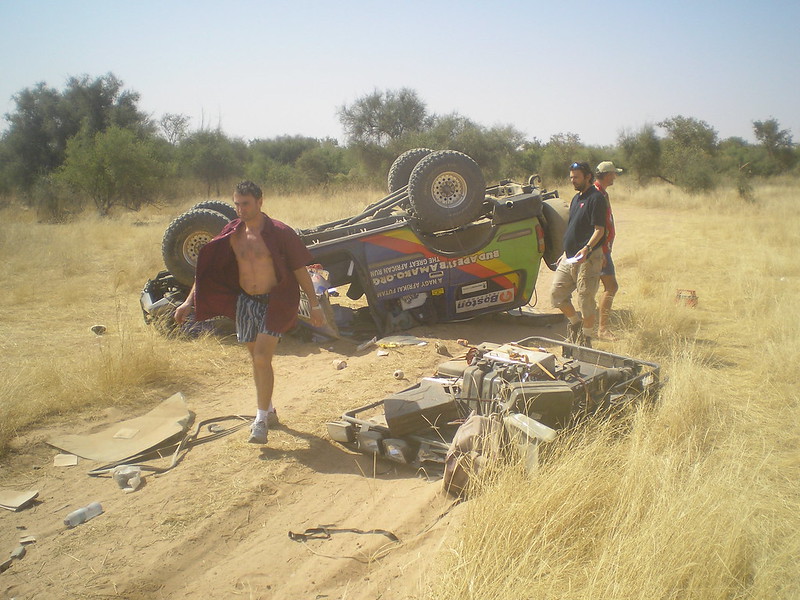
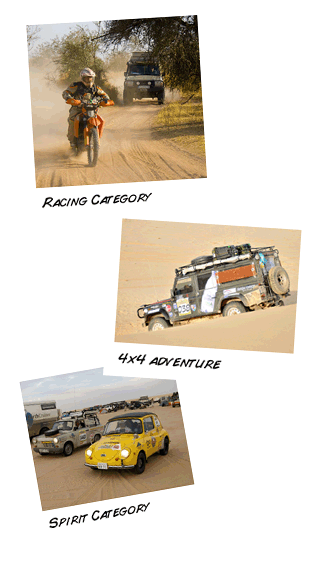 RRACING CATEGORY: In racing category participants have to complete daily stages from one camp to another. Along the road they will have to find geo-challenges, which are navigational points, usually given by GPS coordinates. These points have to be visited, photographed and entered on a daily race sheet. Teams can collect points for completing the daily stages and reaching the geo-points. Penalties are given for missing daily stages or speeding in residential areas. The team with the most points wins. Enudrance, navigation and driving skills matter. Speed is not a deciding factor.
RRACING CATEGORY: In racing category participants have to complete daily stages from one camp to another. Along the road they will have to find geo-challenges, which are navigational points, usually given by GPS coordinates. These points have to be visited, photographed and entered on a daily race sheet. Teams can collect points for completing the daily stages and reaching the geo-points. Penalties are given for missing daily stages or speeding in residential areas. The team with the most points wins. Enudrance, navigation and driving skills matter. Speed is not a deciding factor.
44×4 TOURING CATEGORY: There are no points, no geo-challenges and no tasks to complete. You’ll get a detailed road book with the daily stages, a few daily navigational aids and you’re free to roam and discover. The touring category is about adventure, discovery, connecting with other people and visiting places you never knew existed in the world. However the road can be difficult and a good 4×4 vehicle or off-road bike is highly recommended.
TTOURING CATEGORY: You don’t need a 4×4 vehicle. You can complete this rally category in a passenger car. It doesn’t mean that there will not be dirt roads or difficult sections.
SSPIRIT CATEGORY: This category is essentially the same as Touring. However teams in the Spriti Category have their entry fee waived. Yes, if you preserve the original founding “spirit” of the rally you can come for free. There are only 20 spots left each year and you have to submit your idea for your vehicle early on. If your idea is accepted, you’re in.
The founding moto of the Budapest-Bamako has not changed.
You can entry by car, motorcycle, truck, ATV, side by side even with a shopping cart or on roller skates. However we ask you to be at least 18 years of age.
The road-book is a detailed guide book to the daily stages and the countries and territories that we pass through. The road-book will provide you with advice on how to drive in the Sahara, how to behave in the Sahara, where to buy food and other important issues relating to your trip. The road book will contain information about the road conditions for every stage. It will have a list of the official hotels and campsites as well. The road-book is usually published in December. It will be available for downloading.
The race sheets will be available to participants each morning at the official camp sites. It contains the geo-challenges and navigational points for the day. The race sheet needs to be submitted to the referees at the end of each stage. Races sheets are only given to teams in the racing category.

Every vehicle must have a valid registration, an international insurance (“green card”) and insurance to Mauritania, Senegal, Guinea and Sierra Leone. This will be requested at various border crossings and several times on the road.
Important! If the vehicle is not in the driver’s name, you must have a power of attorney with you in French and English. If the car is owned by a company the authorization must be stamped by the company’s rubber stamp. It may cause complications at border-crossings and checkpoints for you if you don’t have POA from the owner of the car.
“Carnet De Passage” is not needed in any of the countries.
You must have proper liability insurance for Mauritania, Senegal, Guinea and Sierra Leone prior to the start. Our rally permits require that we use certain insurance companies. Don’t worry you can purchase the right insurance through the rally office prior to the rally.
We’ll help you arrange your visa to Mauritania, Guinea and Sierra Leone. EU citizens don’t have to obtain visas to Senegal. Please check if you’ll need another visa, our office arranges the Mauritanian, Guinean (double entries) and Sierra Leonen visa to each participant. If you need a visa to Morocco/Senegal or a Schengen visa you’ll have to arrange it. We’ll require you to submit your data on the Team Info site by November 15, with your passport. Keep in mind that you may obtain your own visas, but they will not be easy. Citizens of the EU, USA, Canada, Australia don’t need a visa to Morocco. If you need a visa, you must obtain a tourist visa on your own. We’re sorry, but we just don’t have to capacity to help you with that. Always check the password protected Team Info site for the latest information!
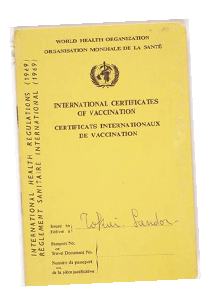 Your best bet is to contact a travelers’ clinic in your home country and inquire about shots and medical precautions needed before undertaking a trip to West-Africa.You get a so called “yellow-book” about your shot against yellow fever. This book is almost as important as your passport. You can’t enter Mauritania, Senegal, Guinea and Sierra Leone without this. Next to the shots it is important to have a medical kit with you. In the roadbook you will have detailed information about this.
Your best bet is to contact a travelers’ clinic in your home country and inquire about shots and medical precautions needed before undertaking a trip to West-Africa.You get a so called “yellow-book” about your shot against yellow fever. This book is almost as important as your passport. You can’t enter Mauritania, Senegal, Guinea and Sierra Leone without this. Next to the shots it is important to have a medical kit with you. In the roadbook you will have detailed information about this.
We recommend packing a medical kit with the following:
The route of the adventure category goes on the road of your choice. The rally travels on roads indicated on roadmaps. However some of those roads are in horrible shape. In Mauritania, Senegal, Guinea and Sierra Leone the marked roads are not the highest quality. This may cause difficulty for two-wheel-drive cars, but it is not impossible. Locals also drive junky 2wheel drive cars in many cases.

The racing category will be hard. If you want to complete all the stages, you have to come with a 4-wheel-drive car. It is not impossible with a two-wheel-drive, but it is sure that you will have to shovel, push and to ask for the help of the locals, if you would like to get every point. In 2010 a 1957 VW Beetle got stuck in the sand in the Moroccan Sahara. He was rescued by a local trucker after loading the bug onto the truck. There is always a solution.
The more maps you have the better. We recommend getting a Michelin 741 Map and also a good map of Morocco and Senegal. Finding maps about Guinea and Sierra Leone will be harderm but not impossible. There’s another important map, which you can’t buy anywhere. It’s even hard to find it on the net. We have it. Download it from here and bring it.
Map Of Banc d’Arguin National Park in Mauritania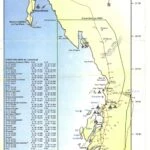
Apart from the maps, you should also bring a GPS. You will need a GPS and not a navigation tool. Do not rely on your smart phone for navigation.
We recommend using an durable, shockproof, dustproof Android tablet with the Budapest-Bamako offroad map uploaded. This map can ordered from us and will be uploaded on an SD card. Another solution is a Garmin compatible device. Make sure that you can enter GPS coordinates and you can upload maps to it.
We offer a full range of GPS maps to participants and GPS solutions.
Every night a hotel or campsite aka bivouac will mark the end of the day’s stage. In bigger towns we’ll spend the night in two-three star hotels. Outside of the cities you will be sleeping in your own tent. Participants will receive an official list of hotels though no one is obliged to stay at these facilities, and it is possible, that not everyone will get a room. Even if you make a reservation and prepay it doesn’t mean that it’ll be there when you arrive. Get a good sleeping bag and a reliable tent. Most of the nights will be spent in bivouacs.
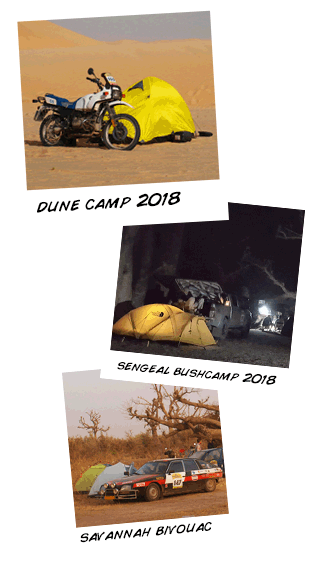
The return from Freetown is completely up to you. What you do with your car is also optional. Here are the most often used finish line options.
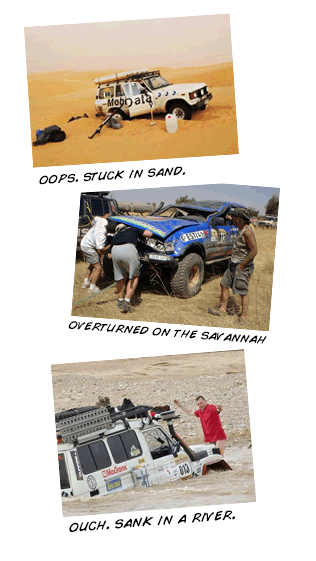 This is one of the most frequently asked questions. The best solution is the prevention. Never go alone! Never go far away from the official route where others may show up to help. No one has ever got stuck in the Sahara forever. The first solution is that you ask for help using your satellite phone or on CB radio and a participant who is near to you pulls you out takes you to the day’s end stage or helps you. The second is that a local pulls you from the trouble. It can be surprising, but in the Sahara there are people everywhere. The third solution is to walk to a paved road and you call help. In 2008 two participants got stuck in soft sand with motorcycles. They walked for 12 hours to the paved road, where they found a local truck, which pulled them out. The official road book contains important information for situations like this and a more detailed trouble shooting manual.
This is one of the most frequently asked questions. The best solution is the prevention. Never go alone! Never go far away from the official route where others may show up to help. No one has ever got stuck in the Sahara forever. The first solution is that you ask for help using your satellite phone or on CB radio and a participant who is near to you pulls you out takes you to the day’s end stage or helps you. The second is that a local pulls you from the trouble. It can be surprising, but in the Sahara there are people everywhere. The third solution is to walk to a paved road and you call help. In 2008 two participants got stuck in soft sand with motorcycles. They walked for 12 hours to the paved road, where they found a local truck, which pulled them out. The official road book contains important information for situations like this and a more detailed trouble shooting manual.
We are also happy to report that no one has ever gotten completely lost or vanished on one of our rallies. Keep an open mind. Have a few days worth of water and food. Know where the nearest road is. Know where the nearest settlement is.
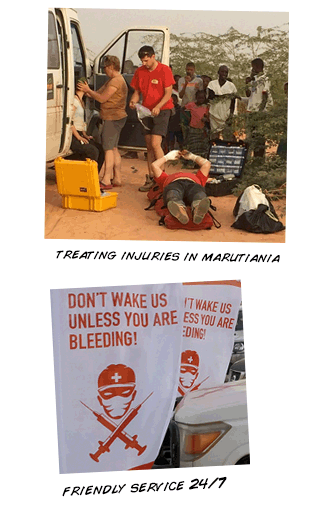 Every year we have an ambulance and a medical crew accompanying the rally. Their job is to give first aid and attend medical emergencies. They travel every day along the official route and spend nights and mornings in the official camp.
Every year we have an ambulance and a medical crew accompanying the rally. Their job is to give first aid and attend medical emergencies. They travel every day along the official route and spend nights and mornings in the official camp.
So if you need a doctor you need to make your way to camp and see one. In case of serious injury or accident you can also call our medical help line and a doctor or ambulance will be dispatched to you.
They can be there in 5 minutes or 5 hours where they are needed. You can find them every night at the official hotel or camp which is given in the road book. You’ll have medical care 24/7 during the race. However keep in mind that they can’t always be at the scene of an accident immediately.
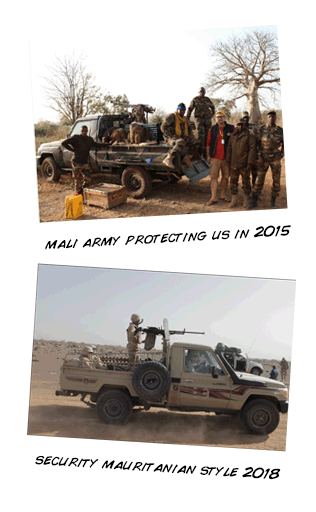
Over the past 15 years the Budapest-Bamako has faced some adverse conditions in Africa. We organized the event in 2008 when the Dakar pulled out of Africa citing terror threats. We have maintained close ties with host governments and a large portion of the entry fees go to cover security. Mauritania and Mali which used to be the highest threat countries provid the highest level of government support to the Budapest-Bamako. In Mauritania each night our camps have been protected by the army. In 2008 during the highest alert the entire rally covered sections of Mauritania in a convoy surrounded by military vehicles making us a “hard target”.
Condition change often. There used to be regular kidnappings in Mauritania. Now there have not been any in the past 10 years. Mali used to be a safe country. Now it has descended into a full crisis. We ask each participant to check the news, verify country risks and threats and make an educated decision about participation.
Keep in mind that Africa has never been a safe part of the world. Virus outbreaks, rebellions, coups, civil wars, ethnic tensions are all part of travel to this region. We’re not going to candy coat it for you. Enter at your own risk.
If you have additional questions please join our Facebook News & Community Group where you can ask people who have been there.
If you have an entry, just wait for the road book. It will have answers to almost every question.
If you’re considering entering and still have questions just drop us a message.
